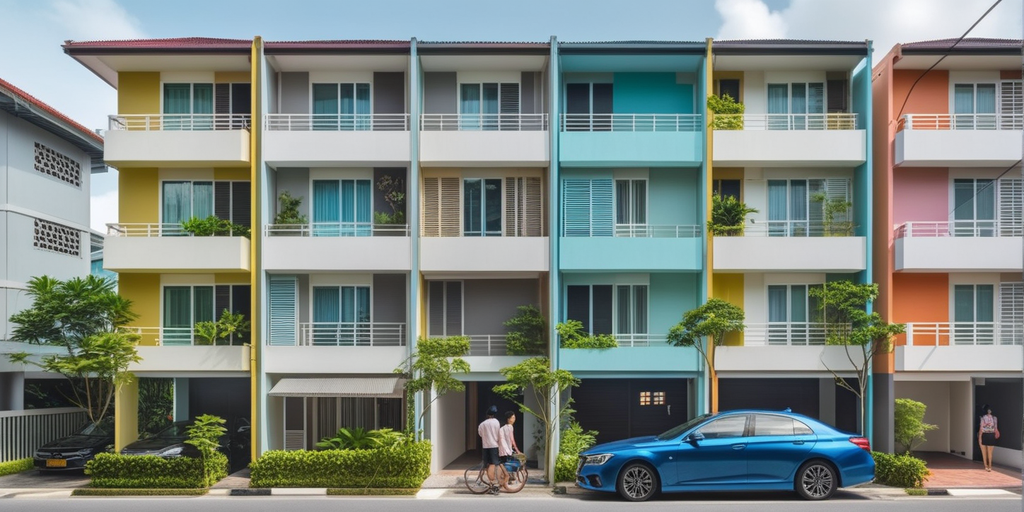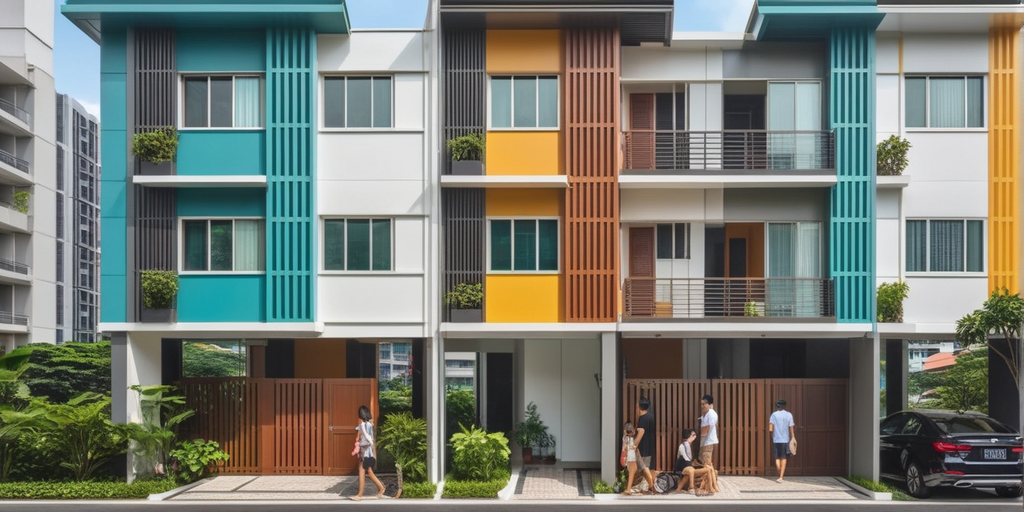If you are planning to purchase a property in Singapore, you may need to take out a housing loan. Understanding how housing loan interest is calculated is essential to make informed decisions and plan your finances accordingly. In Singapore, there are two types of housing loans: fixed-rate and floating rate. Fixed-rate loans have a constant interest rate, while floating-rate loans have an interest rate that fluctuates based on market conditions.

The interest rate on your housing loan is one of the most critical factors to consider. The interest rate is determined by several components, including the loan amount, loan tenure, and the type of interest rate. To calculate the mortgage interest, lenders use a reducing balance model that spreads the total loan amount plus interest across months in the entire loan tenure in a series of fixed payments.
Key Takeaways
- Understanding the components of housing loan interest and how they affect your mortgage interest is crucial.
- Several factors influence mortgage rates, including the type of interest rate, loan tenure, and loan amount.
- Financial planning is essential to ensure that you can afford your home loan repayments and avoid defaulting on your loan.
Understanding Housing Loans in Singapore

If you’re considering purchasing a property in Singapore, understanding the various types of home loans available is crucial. This will help you make an informed decision based on your financial circumstances and preferences.
Different Types of Home Loans
When exploring home loans in Singapore, you’ll encounter various options, including HDB loans and bank loans. HDB loans are offered by the Housing and Development Board, catering specifically to public housing, while bank loans are provided by financial institutions. Each option has its own set of terms, eligibility criteria, and interest rates, so it’s essential to compare and select the most suitable one for your needs.
Fixed Rate Versus Floating Rate
Home loans in Singapore typically come with either a fixed or floating interest rate. With a fixed rate, your interest remains constant throughout a specified period, providing stability and predictability in your repayments. On the other hand, a floating rate fluctuates according to market conditions, potentially offering flexibility and the chance to benefit from lower rates. Understanding the implications of each type will help you decide which aligns best with your financial goals.
HDB Loan Versus Bank Loan
HDB loans are exclusively available for the purchase of HDB flats and come with specific terms and conditions. Bank loans, offered by financial institutions, may provide a wider range of options but require a more thorough assessment of your financial standing. Evaluating the differences between these two loan types will enable you to make an informed choice that suits your individual circumstances.
Components of Housing Loan Interest

When you take out a housing loan in Singapore, the interest you pay is made up of three main components: the principal amount, the interest rate type, and the loan tenure.
Principal Amount
The principal amount is the amount of money you borrow from the lender to purchase your property. This amount is the basis for calculating the interest you will pay on your loan. The larger the principal amount, the more interest you will pay over the course of your loan.
Interest Rate Type
There are two types of interest rates for housing loans in Singapore: fixed rate and floating rate. A fixed rate means that your interest rate will remain the same throughout the entire loan tenure, regardless of market conditions. A floating rate, on the other hand, means that your interest rate will fluctuate based on market conditions.
Loan Tenure
The loan tenure is the length of time you have to repay your housing loan. The longer your loan tenure, the more interest you will pay over the course of your loan. However, a longer loan tenure also means that your monthly instalments will be lower, which can make it easier to manage your finances.
In summary, the three main components of housing loan interest in Singapore are the principal amount, the interest rate type, and the loan tenure. When you take out a housing loan, it’s important to understand how these components work together to determine the amount of interest you will pay over the course of your loan.
Calculating Mortgage Interest

If you’re planning to take out a housing loan, you’ll want to know how mortgage interest is calculated in Singapore. This will help you understand how much you’ll be paying in interest over the life of your loan, and how your monthly payments will be structured.
Amortisation Explained
Mortgage interest is calculated based on the principle of amortisation. This means that your monthly payments are broken down into small, consistent chunks that are spread across the loan tenure. Each payment consists of two parts: a portion that goes towards paying off the principal (the amount you borrowed), and a portion that goes towards paying the interest charged on the loan.
Reducing Balance Method
The reducing balance method is the most common way of calculating mortgage interest in Singapore. Under this method, the interest charged on your loan is based on the outstanding loan balance. This means that as you make payments towards your loan, the amount of interest charged decreases over time.
To illustrate this, let’s say you take out a $500,000 loan with an interest rate of 2% per annum, and a loan tenure of 30 years. In the first year, your monthly payments would be around $1,857. Out of this amount, around $833 would go towards paying off the interest, while the remaining $1,024 would go towards paying off the principal. As you continue to make payments over the years, the amount of interest charged will decrease, while the amount going towards the principal will increase.
Interest-Only Loans
In some cases, you may be offered an interest-only loan. This means that for a certain period of time (usually a few years), you’ll only be required to pay the interest charged on the loan. This can be attractive to borrowers who want to keep their monthly payments low in the short term. However, it’s important to note that interest-only loans can be more expensive over the long term, as you’ll end up paying more in interest charges overall.
To get a better idea of how your mortgage interest will be calculated, you can use a loan amortisation calculator. This will allow you to input your loan amount, interest rate, and loan tenure, and see how your monthly payments will be structured over time.
Factors Influencing Mortgage Rates

When it comes to calculating mortgage rates in Singapore, several factors come into play. Understanding these factors can help you make informed decisions when seeking a housing loan. Here are some key considerations that can influence mortgage rates:
Credit Score and History
Your credit score and credit history play a significant role in determining the interest rate you will be offered. Lenders use this information to assess your creditworthiness and the level of risk associated with lending to you. Maintaining a good credit score and a clean credit history can positively impact the interest rate you are offered.
Loan Size and Downpayment
The size of your loan and the downpayment you are able to make can also affect your mortgage rates. Generally, a larger downpayment can lead to more favourable rates as it demonstrates financial stability and reduces the lender’s risk. Additionally, the size of the loan itself can impact the interest rate, with larger loans often attracting higher rates.
Market Conditions and SIBOR
Mortgage rates are also influenced by broader market conditions and the Singapore Interbank Offered Rate (SIBOR). SIBOR serves as a benchmark for many housing loans in Singapore, and its movement can directly impact the interest rates offered by lenders. Keeping an eye on market trends and SIBOR fluctuations can provide insight into potential changes in mortgage rates.
Understanding these factors can empower you to navigate the mortgage market more effectively and secure favourable terms for your housing loan.
Financial Planning for Home Loans

If you are planning to take a housing loan in Singapore, it is important to plan your finances carefully. Here are some key aspects you need to consider before applying for a home loan:
Total Debt Servicing Ratio (TDSR)
The Total Debt Servicing Ratio (TDSR) is a measure of your ability to service all your existing debts and new loan commitments. It is calculated by dividing your total monthly debt obligations by your monthly income. The Monetary Authority of Singapore (MAS) has set a TDSR limit of 60%, which means that your total monthly debt obligations, including your new housing loan repayment, should not exceed 60% of your monthly income.
Mortgage Servicing Ratio (MSR)
The Mortgage Servicing Ratio (MSR) is a measure of your ability to service your new housing loan commitment. It is calculated by dividing your monthly housing loan repayment by your monthly income. The MAS has set a MSR limit of 30%, which means that your monthly housing loan repayment should not exceed 30% of your monthly income.
Financial Commitments and Status
Before applying for a housing loan, you should take stock of your current financial commitments and status. This includes your income, expenses, savings, investments, and debts. You should also consider your future financial goals and plans, such as retirement, education, and healthcare.
You can use a budget planner or financial calculator to estimate your monthly income, expenses, and savings. You can also check your credit score and credit report to ensure that you have a good credit history and rating. This will help you to negotiate for a better housing loan interest rate and terms.
In summary, taking a housing loan in Singapore requires careful financial planning and management. You need to consider your total debt servicing ratio, mortgage servicing ratio, financial commitments, and status before applying for a loan. By doing so, you can ensure that you can afford the loan repayment and achieve your long-term financial goals.
Advanced Considerations

If you’re considering taking out a housing loan in Singapore, there are a few advanced considerations you should be aware of. These include refinancing and repricing, lock-in periods, and CPF Ordinary Account usage.
Refinancing and Repricing
Refinancing and repricing are both options for changing the terms of your housing loan after you’ve already taken it out. Refinancing involves taking out a new loan with a different financial institution to pay off your existing loan, while repricing involves negotiating new terms with your current financial institution.
Refinancing can be a good option if you’re looking for a better interest rate or more favourable terms, but it can also come with additional fees and charges. Repricing, on the other hand, may be a simpler and less expensive option, but it may not result in as significant a change in your loan terms.
Lock-In Periods
Many housing loans in Singapore come with a lock-in period, during which you’re not allowed to make any changes to your loan terms or pay off your loan in full without incurring penalties. Lock-in periods can range from one to five years, and the penalties for breaking them can be significant.
Before taking out a housing loan, make sure you’re aware of the lock-in period and any penalties that may apply. If you’re considering refinancing or repricing your loan, you’ll also need to take the lock-in period into account.
CPF Ordinary Account Usage
If you’re a Singaporean citizen or permanent resident, you may be able to use funds from your CPF Ordinary Account to pay for your housing loan. This can be a good option if you don’t have enough cash on hand for a down payment or if you want to reduce your monthly loan payments.
However, using your CPF Ordinary Account funds for your housing loan means that you’ll have less money available for other expenses, such as retirement savings. You’ll also need to pay interest on the amount you borrow from your CPF Ordinary Account, so make sure you’re aware of the total cost of borrowing before making a decision.
Overall, refinancing and repricing, lock-in periods, and CPF Ordinary Account usage are all important considerations when taking out a housing loan in Singapore. Make sure you understand the pros and cons of each option before making a decision that’s right for you.
Practical Tools and Resources

Mortgage Loan Calculators
Calculating the interest rate on your mortgage loan can be a daunting task. Fortunately, there are online mortgage loan calculators available that can help you estimate your monthly payments. These calculators take into account your loan amount, interest rate, and loan term to provide you with an estimate of your monthly payments.
Using a mortgage loan calculator can help you determine how much you can afford to borrow. This can be especially useful if you are looking to purchase a new home or refinance an existing mortgage.
Understanding SORA and MAS
The Singapore Overnight Rate Average (SORA) is a benchmark interest rate that is used to determine the interest rate on many financial products in Singapore, including mortgages. The Monetary Authority of Singapore (MAS) is responsible for setting and publishing the SORA rate.
Understanding the SORA rate and how it is calculated can help you better understand the interest rate on your mortgage loan. It is also important to stay up-to-date on any changes to the SORA rate, as this can impact your monthly payments.
Loan Inquiries and Processing Fees
When applying for a mortgage loan, it is important to understand the loan inquiry and processing fees. These fees can vary depending on the lender and the type of loan you are applying for.
Loan inquiry fees are charged by lenders when you apply for a mortgage loan. These fees can include credit report fees, appraisal fees, and application fees. Processing fees are charged by lenders to cover the cost of processing your loan application.
Before applying for a mortgage loan, make sure you understand the loan inquiry and processing fees. You can also compare fees from different lenders to find the best deal.
Frequently Asked Questions

What’s the formula for computing interest on my mortgage?
Calculating interest on your mortgage is pretty straightforward. It is based on your outstanding loan balance and the interest rate. There are two types of loans in Singapore: fixed-rate and floating rate. Fixed-rate means the interest is constant while the floating rate fluctuates based on market conditions. The formula for computing interest on your mortgage depends on the loan type. For example, if you have a fixed-rate loan, your interest is calculated by multiplying the loan amount by the interest rate and the loan term.
Can you explain the workings of mortgage interest in Singapore with a bit of zest?
Mortgage interest in Singapore is calculated based on the outstanding loan balance and the interest rate. The interest rate can be fixed or floating. Fixed-rate loans have a constant interest rate, while floating-rate loans have a rate that fluctuates based on market conditions. The interest rate for housing loans in Singapore is typically higher than for other types of loans because housing loans are secured by the property.
What’s the lowdown on HDB loan interest rates – how do they tick?
HDB loan interest rates are typically lower than those for private housing loans. The interest rate for HDB loans is pegged to the prevailing CPF Ordinary Account interest rate, plus 0.1%. The interest rate for HDB loans is reviewed every quarter and is subject to change.
How do interest rates for housing loans in Singapore spice up my repayments?
Interest rates for housing loans in Singapore can have a significant impact on your repayments. If interest rates rise, your monthly repayments will increase, and if interest rates fall, your monthly repayments will decrease. It’s important to keep this in mind when choosing a loan and to make sure you can afford the repayments even if interest rates rise.
In what thrilling way is the interest for a housing loan figured out?
The interest for a housing loan is figured out by multiplying the loan amount by the interest rate and the loan term. The interest rate can be fixed or floating and is based on prevailing market conditions. The loan term is the length of time over which the loan is repaid. The longer the loan term, the more interest you will pay over the life of the loan.
Could you give me a lively rundown on using a mortgage calculator in Singapore?
Using a mortgage calculator in Singapore is a great way to get an estimate of your monthly repayments. To use a mortgage calculator, you’ll need to enter the loan amount, the interest rate, and the loan term. The calculator will then calculate your monthly repayments based on the information you’ve entered. You can use a mortgage calculator to compare different loan options and to see how changes in interest rates or loan terms will affect your repayments.

